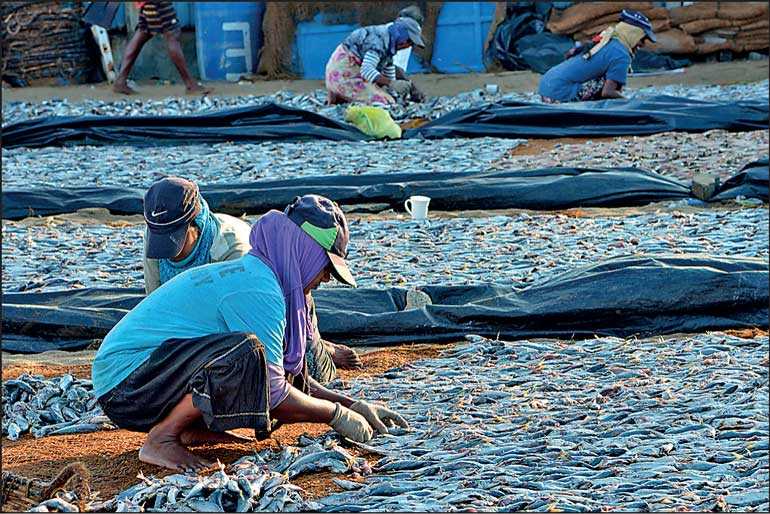Monday Feb 23, 2026
Monday Feb 23, 2026
Wednesday, 12 May 2021 00:00 - - {{hitsCtrl.values.hits}}

Lockdowns and the spread of the virus adversely impacted women entrepreneurs in Sri Lanka – Pic by Shehan Gunasekara
By Jezaayar Hassendeen
 When Sri Lanka’s first lockdown was imposed in March 2020, Qwest Destinations was all set for outbound leisure tours overseas in April. It was a busy time for the company. There were tours and pilgrimages planned to the USA, Europe and other destinations and all of them were booked to capacity.
When Sri Lanka’s first lockdown was imposed in March 2020, Qwest Destinations was all set for outbound leisure tours overseas in April. It was a busy time for the company. There were tours and pilgrimages planned to the USA, Europe and other destinations and all of them were booked to capacity.
“It was a disaster,” says Qwest Destinations Chairperson Lalanee Perera, reflecting on the early days of the COVID-19 pandemic in Sri Lanka and its impact on her business.
The lockdown and closure of international borders to contain the spread of the deadly COVID-19 virus crippled many industries. Leisure and adjacent industries connected to hospitality and tourism were among those badly affected.
Lalanee and her 18-year-old company, which focused on outbound travel, were dealt a blow like never before. “Our task was to pay up passengers who had paid us,” she explained. The entrepreneur had to refund nearly Rs. 400 million to customers and negotiate with multiple leisure partners, who were also reeling from the effects of the pandemic.
Many countries are still experiencing the aftermath of the coronavirus and are in crisis mode. It is still too early to fully measure the impact of COVID-19 on the world, and the signs indicate that we will be under pressure for a long time.
While extensive analysis will have to be done later to evaluate the economic, political, social and psychological effects of COVID-19 and assess the costs of the pandemic, we are witnessing some of the short-term impacts, as well as gendered effects of COVID-19.
Gendered impact of the pandemic
In Sri Lanka, the gendered impact of the pandemic was visible in a rise in domestic violence around the country. The coronavirus also crippled Sri Lankan industries such as tea, apparel production and migrant workers which rely heavily on foreign exchange earnings and employ a large number of women.
Existing labour market inequities and gendered divisions of labour also deepened with women carrying a larger burden of domestic work, the productive value of which is not recognised and has long remained a barrier to Sri Lanka’s future of work as highlighted by the Future of Work in Sri Lanka Report 2019 by the International Labour Organization.
Lockdowns and the spread of the virus also adversely impacted women entrepreneurs in Sri Lanka and women-headed households in the north and north east, resulting in financial precariousness and uncertainty. The impact of COVID is bound to aggravate these findings.
An IFC study on the gendered impact of COVID-19 on Small and Medium-Sized Enterprises in Sri Lanka highlights that over one million Small and Medium-sized Enterprises (SMEs) account for approximately 75% of all businesses across all sectors of the economy, estimating to contribute about 45% of total employment in Sri Lanka.
Women’s ownership of formal SMEs is around 25% of all SMEs, with few making the transition from informal micro-scale businesses, partly due to limited access to finance and lower business capacity, notes the study. The study reports widespread business impacts such a decrease in demand for products and services, decreased sales, difficulties meeting financial obligations and human resource challenges.
The loss of business, lack of physical interactions with markets and stopgaps in supply and delivery also proved to be a considerable challenge for many women entrepreneurs based in Colombo.
Restructuring and rethinking amid challenges
As an entrepreneur who supported numerous livelihoods and with outbound tourism on hold indefinitely, Lalanee Perera had to restructure and rethink her business in the face of these challenges.
Everyone in the company took a pay cut and the business expanded its service verticals in order to retain and employ its existing staff and to cater to new needs.
Qwest Care was a lockdown innovation for Sri Lankans overseas to arrange a range of services for their loved ones and elderly back in Sri Lanka. Whether it was running errands, visiting, delivering regular hampers, making phone calls, accompanying on appointments or attending to tasks such as repairs and bills, Qwest Care offered multiple services for elderly who were separated from their loved ones during the pandemic and lived independently.
Travel, tours and ticketing staff rose to the challenge and were trained to take on these new services. The business also retrained in manufacturing food and beverage items and began undertaking food orders for events and parties as well as distributing hampers.
For Christmas, the company distributed a number of hampers with items such as Christmas cushion covers, bags, Christmas cake, pudding, stolen and more made items in-house and from small vendors.
“One thing that I have learned is to face any situation. It is not easy to sell a tour and we had put many tours together and it [the pandemic] was such a shock and we had to let go all of that. It was a huge hit at a vital point. After all that, we faced it bravely while refunding every cent and doing all of this – I think our company did the right thing,” notes Lalanee. With a vaccine rollout in progress and airports opening up, Lalanee remains hopeful.
Opportunities for new entrepreneurs
With the challenges of the pandemic also came opportunities for new entrepreneurs.
Iresha Ranasinghe is a fulltime working mother with two sons aged five and nine. The insecurities of the pandemic and lockdowns were a stressful period. People had to deal with salary cuts while expenditures remained the same, or in some instances were higher. Expenses like day-care and van fees had to be maintained regularly while electricity and internet bills had doubled as families were homebound and were working and studying from home.
“I realised I needed a backup plan,” explains Iresha, who began a home cooking business and delivery during lockdown.
Iresha and her husband, who also loves to cook and had a passion for innovating, entertained regularly and received rave reviews for her food. When COVID-19 hit, many established restaurants closed down and struggled to adapt.
Iresha soon realised that there were many people who craved healthy and quality food. She launched Rolling Pin by Eesha – a home business making Western and Italian food with a Sri Lankan twist. Iresha and her husband sprang into action, set up and promoted the page on social media, sourced supplies from contacts, obtained a curfew pass for delivery and began taking food orders. “We acted fast,” she reflects, attributing her success to recognising a need and rapidly fulfilling this while emphasising on quality and consistency.
Think big, start small and act fast
Being a pandemic entrepreneur has its challenges. Iresha uses quality ingredients and finding the customer base for this was paramount. Sourcing the ingredients are also a challenge due to weakened supply chains thanks to the pandemic.
Products are made on a pre-order basis and time management is a key component in running the business – Iresha still works fulltime with irregular work hours and balances her home business on the side with the support of her husband. Unexpected curve balls such as electricity outages were also formidable hurdles but Iresha took these into her stride.
For 2021, Iresha has new food innovations on the menu and plans to work to maintain her existing customer base while also expanding to new clientele. Her dream is to one day open a café and support livelihoods through her passion for food.
“The greatest satisfaction apart from getting the order is customer feedback. If you have an idea and you’re good at it and your product is of quality, there are people willing to spend on it. I saw an opportunity and made my passion into a business during the pandemic. You need to think big, start small and act fast,” she emphasised, reflecting on her learnings as a new entrepreneur amidst the challenges of the coronavirus.
(The writer is a WCIC Member and can be reached via WCIC on 0766837888)
[The Women’s Chamber of Industry and Commerce (WCIC) is a premier non-profit organisation supporting women in entrepreneurs, professional businesswomen focused on developing, improving and strengthening the skills of women entrepreneurs. It is the first women only trade chamber to be set up in Sri Lanka in the year 1985. Its vision is to be the ‘think tank,’ ‘voice’ and ‘platform’ empowering women to be powerful nation builders by participating in transforming the economic growth of the nation. With a well-structured Board of Management and Pillar teams and Leaders with dedicated responsibility, the organisation focuses on achieving its detailed objectives with a clearly-defined strategic plan, as well as a plan for action. It has a growing membership and the membership is open to women who believe they can contribute to society as well as benefit from the many facilities the organisation creates.]